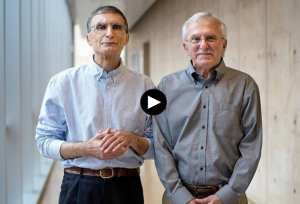2015 Tar Heels of the Year are Aziz Sancar of the University of North Carolina and Paul Modrich of Duke University.

Paul Modrich and Aziz Sancar returned this month from Sweden with a Nobel Prize that officially cites their “mechanistic studies of DNA repair.” Unofficially, the award was a win for every kid who ever disassembled a radio or captured lightning bugs in a jar.
Modrich and Sancar, researchers whose findings will aid in the prevention and treatment of cancer and other diseases, are proof that the most complex scientific discoveries spring from the simplest human query: How does that work?
“This one is for essentially basic science,” Modrich said during a break from preparing his presentation for the Nobel ceremony in Stockholm. He, Sancar and a third winner in the prize for chemistry, Tomas Lindahl of Sweden, each were allotted 30 minutes to summarize their more than 40 years’ work. “The vast majority of discoveries that have clinical impacts come from this kind of research,” Modrich said.
Those who spend their careers in research labs such as Modrich’s, at Duke University, and Sancar’s, at UNC-Chapel Hill, say the work involves long hours, interminable repetition and long odds that a given experiment will yield the anticipated results – or any useful results. Investigators worry almost constantly about landing and renewing the highly competitive grants that fund their work and that of their graduate students and postdoctoral fellows. They feel nearly unrelenting pressure to publish papers that break new ground in their fields.
What drives them day after day, decade after decade, is an irrepressible need to find the truth.
Story courtesy of:
